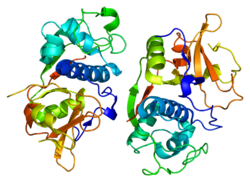组织蛋白酶F(英文:Cathepsin F)是一种在人体中由CTSF基因编码的蛋白质。[6][7][8]
Quick Facts 组织蛋白酶F, 已知的结构 ...
Close
木瓜样蛋白酶是半胱氨酸蛋白酶家族,代表溶酶体蛋白水解系统的主要成分。通常,组织蛋白酶包含一个信号肽,然后是一个前肽,再然后是一个催化活性成熟区。组织蛋白酶F前体非常长的(251个氨基酸残基)前区包含一个与组织蛋白酶L样酶的前段相似的C端结构域、一个50个残基的柔性连接肽和N端结构域预计采用胱抑素样折叠组织蛋白酶F前区在木瓜蛋白酶家族半胱氨酸蛋白酶中是独一无二的,因为它包含这个额外的N端片段,预计与胱抑素超家族的半胱氨酸蛋白酶抑制剂具有结构相似性。这种胱抑素样结构域包含一些已知对抑制活性很重要的元素。CTSF编码预测的484个氨基酸的蛋白质,其中包含19个残基信号肽。组织蛋白酶F含有五个潜在的N-连接糖基化位点,它可能通过甘露糖6-磷酸受体途径靶向内体/溶酶体区室。组织蛋白酶F基因普遍表达,它定位于染色体11q13,接近编码组织蛋白酶W的基因。[8]
组织蛋白酶F可用作测试泰国肝吸虫造成的疾病的替代方法。[9]近年来,泰国肝吸虫的诊断一直通过大便检查来完成,被认为是“金标准”方法。然而,基于粪便的诊断可能是不可靠的[10],尽管它是一种非侵入性方法。进行的实验表明,通过使用重组DNA技术和组织蛋白酶F半胱氨酸蛋白酶,可以产生更可靠的结果。
最近的实验表明在虾夷盘扇贝中发现了组织蛋白酶F。[11]在虾夷盘扇贝的各个胚胎发育阶段鉴定组织蛋白酶F基因具有重要意义。组织蛋白酶F基因在先天免疫反应中具有重要作用。虾夷盘扇贝一直因细菌性疾病而遭受高死亡率。组织蛋白酶F的发现可以领导进一步的研究和解决虾夷盘扇贝死亡率问题的方法。
Wang B, Shi GP, Yao PM, Li Z, Chapman HA, Bromme D. Human cathepsin F. Molecular cloning, functional expression, tissue localization, and enzymatic characterization. J Biol Chem. Dec 1998, 273 (48): 32000–8. PMID 9822672. doi:10.1074/jbc.273.48.32000  .
. Santamaria I, Velasco G, Pendas AM, Paz A, Lopez-Otin C. Molecular cloning and structural and functional characterization of human cathepsin F, a new cysteine proteinase of the papain family with a long propeptide domain. J Biol Chem. Jun 1999, 274 (20): 13800–9. PMID 10318784. doi:10.1074/jbc.274.20.13800  .
. Korkmaz, Huseyin; Findik, Duygu; Ugurluoglu, Ceyha; Terzi, Yuksel. Reliability of stool antigen tests: investigation of the diagnostic value of a new immunochromatographic Helicobacter pylori approach in dyspeptic patients. Asian Pacific Journal of Cancer Prevention. 2015, 16 (2): 657–660. ISSN 2476-762X. PMID 25684503. doi:10.7314/apjcp.2015.16.2.657  .
.
- Nägler DK, Sulea T, Ménard R. Full-length cDNA of human cathepsin F predicts the presence of a cystatin domain at the N-terminus of the cysteine protease zymogen.. Biochem. Biophys. Res. Commun. 1999, 257 (2): 313–8. PMID 10198209. doi:10.1006/bbrc.1999.0461.
- Wex T, Levy B, Wex H, Brömme D. Human cathepsins F and W: A new subgroup of cathepsins.. Biochem. Biophys. Res. Commun. 1999, 259 (2): 401–7. PMID 10362521. doi:10.1006/bbrc.1999.0700.
- Wex T, Wex H, Brömme D. The human cathepsin F gene--a fusion product between an ancestral cathepsin and cystatin gene.. Biol. Chem. 2000, 380 (12): 1439–42. PMID 10661872. S2CID 28469574. doi:10.1515/BC.1999.185.
- Shi GP, Bryant RA, Riese R, et al. Role for cathepsin F in invariant chain processing and major histocompatibility complex class II peptide loading by macrophages.. J. Exp. Med. 2000, 191 (7): 1177–86. PMC 2193169
 . PMID 10748235. doi:10.1084/jem.191.7.1177.
. PMID 10748235. doi:10.1084/jem.191.7.1177.
- Deussing J, Tisljar K, Papazoglou A, Peters C. Mouse cathepsin F: cDNA cloning, genomic organization and chromosomal assignment of the gene.. Gene. 2000, 251 (2): 165–73. PMID 10876093. doi:10.1016/S0378-1119(00)00196-7.
- Strausberg RL, Feingold EA, Grouse LH, et al. Generation and initial analysis of more than 15,000 full-length human and mouse cDNA sequences.. Proc. Natl. Acad. Sci. U.S.A. 2003, 99 (26): 16899–903. Bibcode:2002PNAS...9916899M. PMC 139241
 . PMID 12477932. doi:10.1073/pnas.242603899
. PMID 12477932. doi:10.1073/pnas.242603899  .
.
- Oörni K, Sneck M, Brömme D, et al. Cysteine protease cathepsin F is expressed in human atherosclerotic lesions, is secreted by cultured macrophages, and modifies low density lipoprotein particles in vitro.. J. Biol. Chem. 2004, 279 (33): 34776–84. PMID 15184381. doi:10.1074/jbc.M310814200
 .
.
- Gerhard DS, Wagner L, Feingold EA, et al. The status, quality, and expansion of the NIH full-length cDNA project: the Mammalian Gene Collection (MGC).. Genome Res. 2004, 14 (10B): 2121–7. PMC 528928
 . PMID 15489334. doi:10.1101/gr.2596504.
. PMID 15489334. doi:10.1101/gr.2596504.
- Vazquez-Ortiz G, Pina-Sanchez P, Vazquez K, et al. Overexpression of cathepsin F, matrix metalloproteinases 11 and 12 in cervical cancer.. BMC Cancer. 2006, 5 (1): 68. PMC 1175083
 . PMID 15989693. doi:10.1186/1471-2407-5-68.
. PMID 15989693. doi:10.1186/1471-2407-5-68.
- Kaakinen R, Lindstedt KA, Sneck M, et al. Angiotensin II increases expression and secretion of cathepsin F in cultured human monocyte-derived macrophages: an angiotensin II type 2 receptor-mediated effect.. Atherosclerosis. 2007, 192 (2): 323–7. PMID 16963053. doi:10.1016/j.atherosclerosis.2006.08.001.
- The MEROPS online database for peptidases and their inhibitors: C01.018

